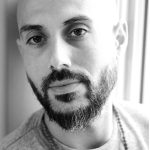The Contemplative Column
by Staff Writer Theodore Richards
Header Image by Leslie M. Browning
Nature and Culture
New England has always been a special place for me. Having grown up on the east coast, it was a place for my family to go for a touch of the wild. And, at the same time, it was—for America at least—so old and so cultured. Summer trips to Lake Sunapee in New Hampshire were my earliest experience of semi-wild spaces. Later, as a young adult, I lived from August to December in the Berkshires, staying in an isolated commune on the side of a mountain. In many ways, I can trace my rediscovery of the wild to those four, pivotal months. But, again, we were never far from culture—Williams college was minutes away; we saw Noam Chomsky speak at another nearby university. It is this juxtaposition, perhaps, of wilderness and culture that gives New England a unique place in American spirituality. Indeed, the dynamic tension between these two elements of human experience is fundamental to human spirituality, to the way we put together our world and our selves.
The Movement
Out of this milieu, unique traditions in American spirituality have arisen, in particular the Transcendentalists. More broadly, the Transcendentalists can be placed in the context of the movement known as Romanticism, a philosophical and artistic movement that pushed back against the dualism of the Enlightenment. Nature and self are seen as unified—the self as a microcosm of the whole of Nature; Nature as an expression of the divine.
Foremost among the Transcendentalists was Emerson. Deeply influenced both by the woods of his New England boyhood and by the Eastern texts he’d been exposed to, particularly the Upanisads, Emerson writes in his seminal work, Nature:
Standing on the bare ground,—my head bathed by the blithe air, and uplifted into infinite space,—all mean egotism vanishes. I become a transparent eye-ball; I am nothing; I see all; the currents of the Universal Being circulate through me; I am part or particle of God.
It is this direct experience of the divine through nature and the expansive notion of self—beyond the shrunken down consumer of the modern capitalist self—that typifies the movement known as New England Transcendentalism.
Emerson articulates a true American mysticism, one that combines rigorous intellectualism with direct experience, thorough theology with ecological embeddedness. In his famous Harvard Divinity School address, he tells the graduates to “go alone” and to “refuse the good models, even those which are sacred in the imagination of men, and dare to love God without mediator or veil.” Essentially describing formal religious services as a waste of time, he declares, “Whenever the pulpit is usurped by a formalist, then is the worshipper defrauded and disconsolate.” And the notion that only Jesus Christ was by nature divine he called a “perversion.” This would be radical stuff today; in 1838, it was unheard of. The divine, for Emerson, was found in self and cosmos, in the beauty that one could experience all around.
It was Henry David Thoreau, another New Englander and Emerson’s contemporary, who turned these ideas into living art, connecting religious philosophy to a pursuit of justice in the world and, in his simple life at Walden, a new way of living and being in the world. He writes:
Let us first be as simple and well as Nature ourselves, dispel the clouds which hang over our brows, and take up a little life into our pores. Do not stay to be an overseer of the poor, but endeavor to become one of the worthies of the world.
Thoreau understood that Nature as an idea—just like God as an idea, or even the Self—is only of value if we can actually experience and embody it. Moreover, there is a relationship to these ideas of divinity and direct experience—a democratization of spirituality—and a more just world. There have, of course, been other mystical movements in American religiosity—Pentecostalism, for example—but few that were able to integrate authentic movements for social justice. Indeed, it could be argued that Thoreau, although not as accomplished a thinker as Emerson, has been far more influential, having influenced such philosopher-activists as Dr. Martin Luther King, Jr. and Gandhi. His radical call for simplicity is as important today as it was then: “A man is rich in proportion to the number of things which he can afford to let alone.”
Finally, although he is not a New Englander, I cannot fail to mention Walt Whitman, whose Leaves of Grass perhaps is the most profound poetic expression of this movement. “All truths wait in all things,” he writes, “I believe a leaf of grass is no less than the journey-work of the stars.” Whereas Emerson provides an American theology, Whitman’s poem is American scripture, a declaration of the self as deeply interconnected to all things, and of the sacredness of all things. In a world that, as industrial capitalism emerged, was about to become increasingly desacralized and individualistic, that message would become even more important.
Today
A movement, I believe, is beginning to emerge today that can eclipse Transcendentalism in terms of its significance—indeed, it must surpass it given some of the challenges we face.
Foremost among these challenges is the ecological crisis, which includes both mass extinction and climate change. This challenge requires not merely new technologies or politics, but a re-imagining of what it means to be human. This is a spiritual endeavor; for it asks of us the question, “what is sacred?” The recognition of the sacredness of nature was a fundamental lesson from the spirituality of the Transcendentalists that we can apply today.
Economics cannot, of course, be separated from ecology. This is why Thoreau’s call for simplicity is so important. To recognize the sacredness of nature—and to actually do something about our footprint on the planet—requires us to live more simply.
Moreover, so much of our inability to live simply comes out of our shrunken-down selves. We think we are what we buy. We are “consumers”. A sense of self that sees us as participating in an interconnected cosmos makes so much of our needless consumption, well, needless.
For Emerson’s call for a more democratic and individualistic spirituality only makes sense in the context of his broader philosophy that recognized each individual as reflections of the whole, and of a whole as an interconnected, ensouled cosmos.
What does it mean to be a human being in the modern world? This is a question we are only just beginning to answer. It is odd, perhaps, to even attempt to answer such a question in America. For we truthfully do not even know what it means to be an American. James Baldwin, who understood America’s contradictions better than anyone, writes in The Discovery of What it Means to Be an American:
America’s history, her aspirations, her peculiar triumphs, her even more peculiar defeats, and her position in the world—yesterday and today—are all so profoundly and stubbornly unique that the word “America” remains a new, almost completely undefined and extremely controversial proper noun. No one in the world seems to know exactly what it describes, not even we motley millions who call ourselves Americans.
Contradiction is at the very core of the United States, a nation founded by slave-owners who wanted to be free. In New England—a place named for the Old Country from which it wanted to differentiate—we find the very roots of the American paradox: freedom and responsibility; nature and culture; individuality and community. Recognizing these paradoxes and contradictions is the only way to honestly re-imagine our selves. Freedom, for example, sounds good; but without interconnectedness, it can lead only to loneliness.
Perhaps, the lack of certainty Baldwin expresses above is something fundamental to the human experience. We just don’t know what it means to be an American, or a Christian, or a man or woman or, indeed, a human being. A few men living in 19th century New England cannot tell us definitively what it means to be a human being in the twenty-first century, but we can look to their willingness to grapple with difficult questions with integrity as a first step.
 Theodore Richards is a novelist, philosopher, and educator, and is the director and founder of The Chicago Wisdom Project. He is the author of several books, most recently the novel The Conversions, and the recipient of numerous literary awards. He lives on the south side of Chicago with his wife and daughters. Visit www.theodorerichards.com
Theodore Richards is a novelist, philosopher, and educator, and is the director and founder of The Chicago Wisdom Project. He is the author of several books, most recently the novel The Conversions, and the recipient of numerous literary awards. He lives on the south side of Chicago with his wife and daughters. Visit www.theodorerichards.com

